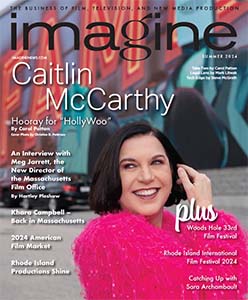<h2>Finding Tax Incentives & Locations in the Smallest State with the Greatest Backlot</h2>
By Steven Feinberg
“Location! Location! Location!” The important magic words in a private conversation as to where a potential movie will be shot right after we’ve discussed the first question about what’s available for tax credit incentives.
The next questions that come up are often like these: “Do you have an abandoned high school where we can have zombies eating up people in the corridors?” “We need a small town train station we can control for a week because a loyal dog will be waiting for his master.” “Do you have any government buildings that can double as Washington, DC?” “Is there a boy scout camp anywhere?” “How about an idyllic lighthouse?”
 For over forty years, I’ve been making movies and whenever a conversation comes up about a movie searching for a home, it’s time to put on my “director’s cap” and try to anticipate the needs of the filmmaker by capturing photographs of the main locations or “anchor locations” which should best represent the production’s concept. For example, when Disney was looking for a home with UNDERDOG, the Rhode Island Film & TV Office spent a weekend taking approximately 250 photographs of the Rhode Island State House, downtown Providence, Hope High School, an affluent neighborhood in Cranston, and a lower income residential neighborhood in Providence, and photographs of the interior of the Cranston Street Armory and its vast marching hall, which ultimately housed the sets of the production. Ninety percent of those initial locations were used on the final film.
For over forty years, I’ve been making movies and whenever a conversation comes up about a movie searching for a home, it’s time to put on my “director’s cap” and try to anticipate the needs of the filmmaker by capturing photographs of the main locations or “anchor locations” which should best represent the production’s concept. For example, when Disney was looking for a home with UNDERDOG, the Rhode Island Film & TV Office spent a weekend taking approximately 250 photographs of the Rhode Island State House, downtown Providence, Hope High School, an affluent neighborhood in Cranston, and a lower income residential neighborhood in Providence, and photographs of the interior of the Cranston Street Armory and its vast marching hall, which ultimately housed the sets of the production. Ninety percent of those initial locations were used on the final film.
It comes down to the right aesthetic, along with the availability of the location and of course, is the price right?

Sometimes we only have a half day to find the spots. On other occasions, we may take days or a week to find locations which we hope will tickle the creative minds of the director and writer while also soothing the practical minds of the producer, line producer and production manager.
Confident that we’ve done our best, we send the images to the director and producer and creative team via email, or secure website and/or binders sent overnight, the creative team will typically come to the state for an on the ground visit. Because Rhode Island is only 48 miles long and 40 miles wide, we can cover lots of ground in a relatively short period of time. My office will typically be the first to contact the targeted location representative to discuss the potential opportunity and gauge their interest for making a movie on their premises.
As soon as there is major interest in the area, and the filmmakers are sparked to the idea of making their movie in Rhode Island, and mentally connect with the anchor locations they’ve seen so far, we often hand off the potential client (filmmaking team) to an experienced, local location scout who can dedicate their full-time energy on this one project, and provide additional locations and follow up with specific details regarding the production and required dates for filming.

When an owner of a location likes the idea of filming at his or her establishment, then comes the important negotiation. How long does the production company need the space? How much are they willing to pay? What are considerations required to ensure that the place will be returned to its previous condition or better?! These are things that are privately discussed, along with insurance policies and legal paperwork.

It’s essential that both filmmakers and owners protect their interests. Do not take this lightly! Accidents happen! Rules and regulations about a particular location should be made in writing! Anticipate worst-case scenarios so you each can protect yourselves. You don’t want any surprises. I cannot stress that enough. If there is a particular stone surface that could be damaged by a vehicle’s weight, etc, that area should be protected and both owner and filmmaker should be responsible to ensure that this is a positive experience. Remember: When you are making a movie, you don’t just represent your one production, but you represent the overall film community and if you screw up, you make the entire film world look bad. Be the best you can be and always strive to leave a positive footprint behind.
If you don’t know what you’re doing, please ask a professional location scout or call your local film office for advice. We’re here to help you!

Now beware the frenzied zombies stalking the corridors and go play among the marble pillars of the Newport mansions or the wondrous Woonsocket train station or Wes Anderson’s favorite campgrounds or even better…. simply discover your own, hidden, movie magic jewel and shine!
Steven Feinberg is the Executive Director of the Rhode Island Film Office, serving the Ocean State where he was born and raised and to where he returned after becoming a veteran filmmaker in LA. He fired up the film community and the legislature in 2004 to be the first New England State to offer significant Film Tax Credits.
All photos by Lew Place , courtesy of the Rhode Island Film Office.




